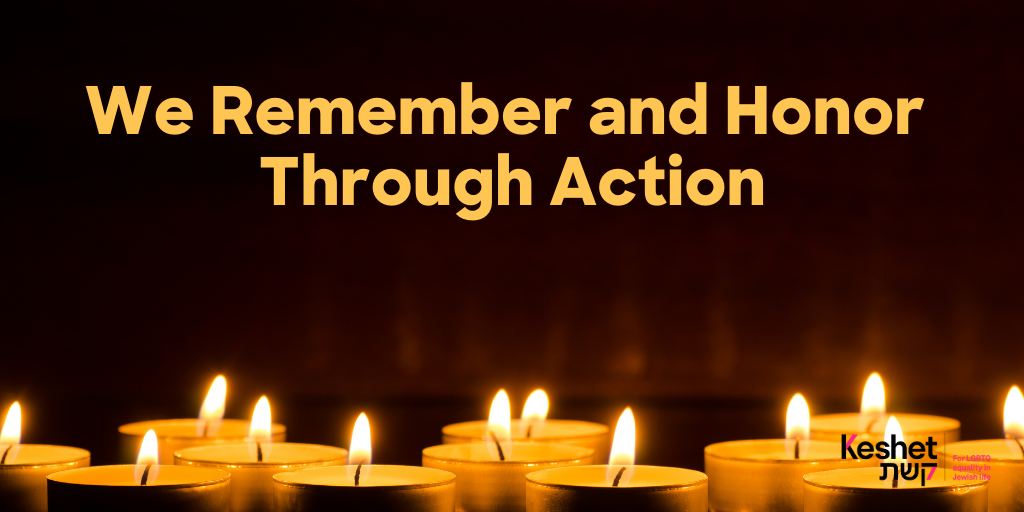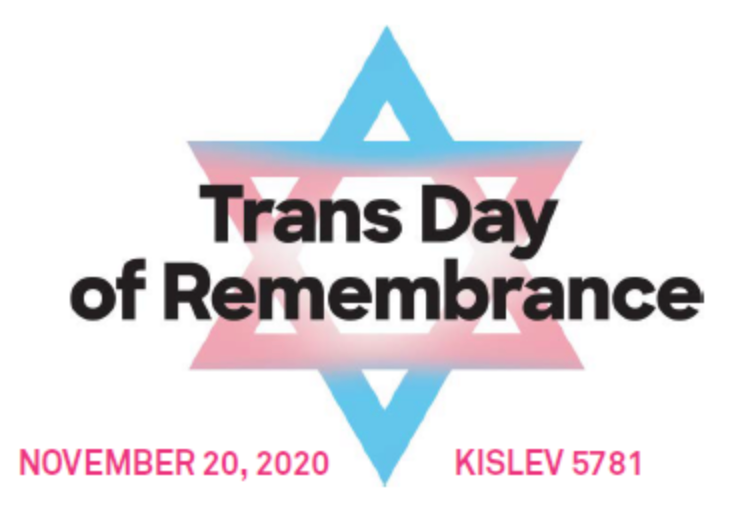

NOTE: This article was written in 2020 and we continue to share it annually.
We Remember and Honor Through Action
by Seth M. Marnin and Rabbi Mike Moskowitz
This Friday, November 20th, we will again observe Transgender Day of Remembrance. We will again read the names of those who were killed by anti-transgender violence this year. And again we must ask ourselves: how do we meaningfully honor their lives?
The Talmud explains that honoring those who are no longer with us involves more than simply refraining from actions that would disappoint them. Rather, in order to honor them, we must do something productive and effect change.
 How can we ensure there are no more names on a memorial list? How can we work to create a world where we celebrate the contributions and presence of transgender people? How can we devote our efforts to creating a world where transgender people do not need to fear for their safety or feel compelled to hide their identities in order to remain safe?
How can we ensure there are no more names on a memorial list? How can we work to create a world where we celebrate the contributions and presence of transgender people? How can we devote our efforts to creating a world where transgender people do not need to fear for their safety or feel compelled to hide their identities in order to remain safe?
This week’s parsha offers insight into answering these hows. The consequences of feeling compelled to hide an identity are recounted in Toldot. We read that Isaac and Rebecca live in Gerar but do not feel safe revealing their relationship to the other residents. When the men of Gerar ask about Rebecca, rather than tell them that she is his wife, Isaac lies and claims that Rebecca is his sister (Gen. 26:7). When Avimelech, King of the Philistines, realizes that they are in fact married, he confronts Isaac. Isaac explains that he had been afraid that the truth about Rebecca’s identity as his wife would get him killed (Gen. 26:9).
Avimelech makes it clear that Isaac’s inability to be candid about Rebecca’s identity is dangerous for the community. The king worried that the community would act inappropriately because they misconstrued her relationship to Isaac. Addressing Isaac’s fears, the king threatened the people of Gerar with death if they harmed Isaac or Rebecca (Gen. 26:11). The results of Avimelech’s advocacy were immediate and miraculous. Isaac and Rebecca thrived (Gen. 26:12). They went from living in fear to flourishing in one verse. Avimelech’s leadership not only created a safe space to acknowledge Rebecca’s identity, but he used his power to change the dominant culture and can serve as a role model in this way.
So what lessons can we take away from this narrative? Everyone, but especially our leaders, can make an immediate and meaningful difference in the lives of transgender people. It also tells us about the value of educating the community to respect authentic identities, and teaching the community members how to conduct themselves appropriately.
Here are some ways that we all can honor the lives of those we remember on Transgender Day of Remembrance:
Educate yourself.
Make transgender lives visible and livable in our communities.
Teach our community members how to be respectful.
The need to have a list of those we have lost on Transgender Day of Remembrance reflects our communal failure to value and protect all of G-d’s children. Each of us can lead by example. We can be passive in our response to the violence and the names on the list. Or we can choose to change it. We must do everything within our power to ensure that there is no list next year. Keyn yehi ratzon.
Seth M, Marnin, attorney, civil rights advocate, pursuer of justice & Chair of Keshet’s Board of Directors.
Rabbi Mike Moskowitz, CBST’s Scholar-in-Residence for Trans and Queer Jewish Studies.